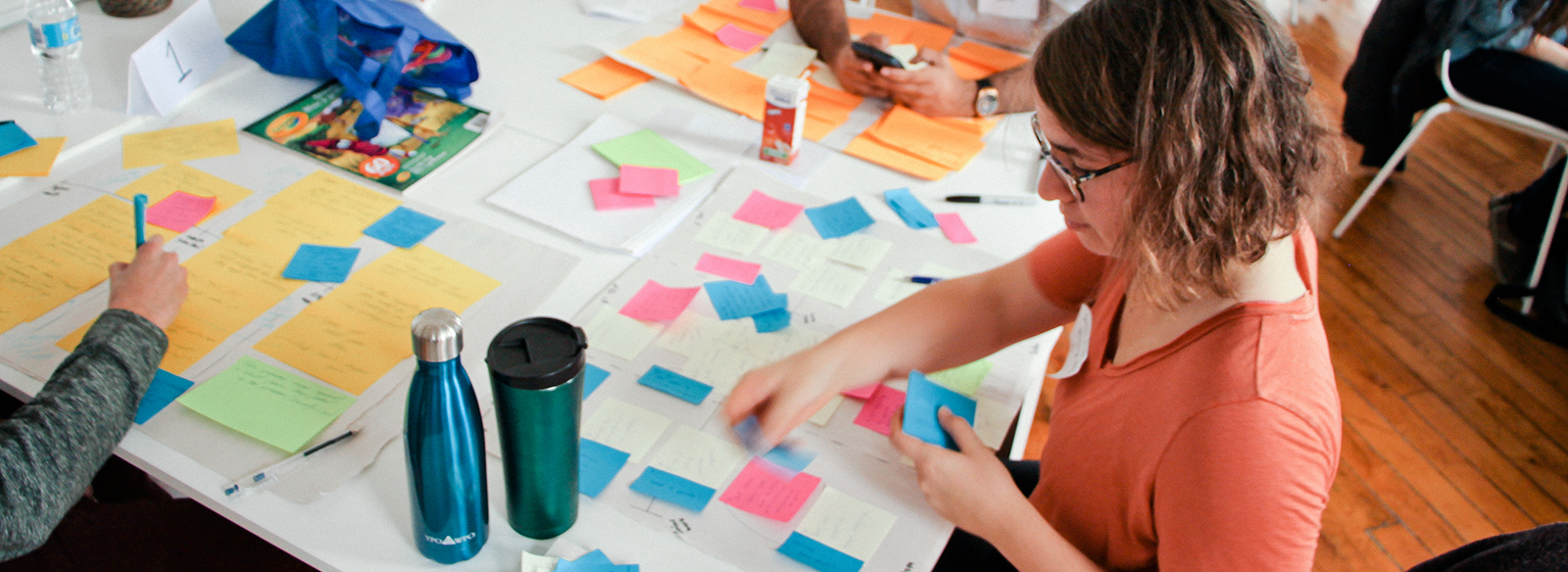
Warning: Undefined variable $post in /var/www/html/rc-ecampus.ecampusontario.ca/wp-content/themes/ecampusontario/functions.php on line 183
Warning: Attempt to read property "ID" on null in /var/www/html/rc-ecampus.ecampusontario.ca/wp-content/themes/ecampusontario/functions.php on line 183
4 min. Read
An era of disposable assignments?
Last year, the SXD Lab hosted a student-led Education Design Sprint that explored the concept of exponential learning. Specifically, the focus of the sprint was on a student concern known as disposable assignments. Within academia, disposable assignments often take the form of writing and research that are time consuming for students to develop and for faculty to grade. It’s tedious work that faculty members and students both complain about.
David Wiley, who is largely considered a thought leader when it comes to Open Pedagogy, has written extensively about his concerns related to disposable assignments:
“These are assignments that students complain about doing and faculty complain about grading. They’re assignments that add no value to the world – after a student spends three hours creating it, a teacher spends 30 minutes grading it, and then the student throws it away. Not only do these assignments add no value to the world, they actually suck value out of the world (Wiley, n.d.).”
As Wiley argues, disposable assignments do not contribute meaningfully to post-secondary learning experiences. This is why the eCampusOntario SXD Lab, with its focus on purposeful learning for a meaningful life, is spearheading a project called Exponential Learning. This project is led by three students (Anne Filion, Eric Chung and Danielle Cruz) who are looking at ways of making assignments more meaningful for learners.
You can easily imagine a scenario where year after year course assignments are used and reused, requiring students to do the exact same work over and over with no value added. What if students were allowed to build on the work of previous students and do something new that future students could benefit from? Let’s take employment for example, you go to work, you perform a task that helps the employer and you get rewarded. The task you perform likely contributes to the goals of company: you are there for a reason. Now let’s apply that same concept to education: students go to school, perform tasks and the rewards they receive are grades and (hopefully) new knowledge. The part that’s missing is the contribution. Most of the tasks students perform have no meaning or positive effect for anyone other than the student’s learning. They are likely looked at once by an overworked grad student and then discarded, contributing nothing back to the student, institution, or society more broadly.
What if we prescribed meaning to this meaningless work? What if students learned by doing and were able to grow knowledge exponentially? The SXD students imagine a scenario where the work they complete benefits the wider world in some way.
If we begin to think of students as producers of knowledge, rather than consumers, you can imagine the societal possibilities for education. As Wiley also states, if faculty members convert disposable assignments into projects and activities that add value to the world, then all parties involved will feel rewarded for the time and effort invested. I am also betting that student motivation and engagement would skyrocket if learners were provided opportunities to work on something with authentic purpose.
In November 2017, Christina Hendricks, Professor of Teaching in the Department of Philosophy at UBC, keynoted the eCampusOntario Technology-Enabled Seminar and Showcase (TESS). In this keynote, she highlighted the need to shift the emphasis on students from knowledge consumption to knowledge contribution. This shift, Dr. Hendricks argued, has potential for meaningful and productive societal returns.
As highlighted by numerous thought leaders, non-disposable assignments have the potential to positively impact the world and benefit learners and educators. But I must admit that there are challenges present in this paradigm shift that need to be addressed:
- How do faculty members and students find projects and opportunities for work that benefits others?
- How can institutions ensure that real-world projects (contributions with value) do not exploit student time and effort where the rewards take the form of grades and new knowledge?
So, the questions that remain, how can we encourage educators, the gatekeepers of academia, to take action and experiment with this form of pedagogy? What can eCampusOntario and/or the SXD Lab do to shine a light on non-disposable assignments?
For a list of non-disposable assignment examples, please click here.
Article written by Chris Fernlund, Project Lead, Student Services. Follow him on Twitter @fernfeed.


